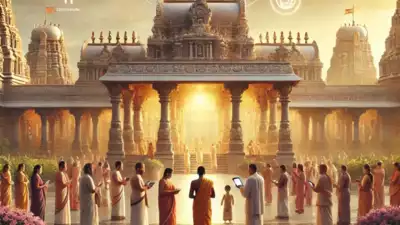Temples unite for global transformation; to embrace modern management practices – The Times of India

MUMBAI: In an unprecedented initiative, around 32 lakh temples worldwide, predominantly in India, encompassing an economy worth around Rs 6 lakh crore, are poised to establish a networking chain under a singular federation. This aims to develop, operate, and manage tourism and spiritual circuits systematically, ensuring temples become accessible to the general public in an efficient and transparent manner.
To actualise this objective, the International Temples Convection and Expo (ITCX) 2025, the world’s largest conclave dedicated to temple administration and management, is scheduled at Asha Conventions, Tirupati, between February 17 and 19. Organised in collaboration with Antyodaya Pratishthan, the ITCX 2025 will amalgamate Hindu, Sikh, Buddhist, and Jain institutions, providing a vibrant platform to network, fortify, and modernise temple ecosystems globally whilst preserving their rich cultural heritage.
“Initially, it will witness participation from approximately 2,000 devotional institutions across 58 countries and will showcase 111+ speakers, 15 workshops & knowledge sessions, and 60+ stalls at the expo. The convention, dubbed as ‘Mahakumbh of Temples’ – ITCX, endeavours to implement resolutions to enhance devotee experience by engaging, empowering, and augmenting the temple economy. ITCX 2025 will facilitate global collaboration between temple leaders, policymakers, and industry experts, focusing predominantly on progressive temple management beyond religious aspects,” said Prasad Lad, Chairman of the ITCX. The ITCX has already reached over 12,000 temples globally.
Post-pandemic, spiritual tourism has taken centre stage with a substantial increase in the number of travellers worldwide. For instance, the Vaishno Devi Temple now receives 32,000 to 40,000 pilgrims daily, up from 10,000 to 15,000 during the same period prior to the pandemic.
Meanwhile, at least one lakh people visit the Golden Temple in Amritsar daily, surpassing pre-pandemic figures. A similar pattern is observed in the Guruvayur Temple in Kerala, where daily visitors range from 6,000 to 7,000, compared to the pre-pandemic tally of 4,000.
It is estimated that the travel and tourism industry alone employs more than 80 million people in India, with a year-on-year growth rate exceeding 19%. The global religious tourism market is projected to reach USD 2.22 billion by 2032 with a CAGR of 6.25%, according to a KPMG study.
Topics to be discussed at the convention encompass a comprehensive range of temple operations, from fund management and crowd control to sustainability and security protocols, with particular emphasis on modernising temple management through AI, digital tools, and fintech solutions. Key focus areas include langar (community kitchens), waste management and recycling, sustainable energy practices, and legal compliance.
The discussions will also cover essential community services such as medical aid, educational programmes, and charitable initiatives, all aimed at creating more efficient and socially impactful temple ecosystems, said Giresh Kulkarni, founder of Temple Connect, a platform for documenting and digitising information about temples of Indian origin.
ITCX 2025 has secured support from the Government of India through the Ministry of Tourism, Ministry of Culture, and the Incredible India initiative, with Maharashtra Tourism Development Corporation (MTDC) joining as the presenting partner. The convention is additionally strengthened by the backing of the Archaeological Survey of India and Tourism & Endowments boards from Andhra Pradesh, Kerala, Karnataka, and other states.
“India, home to over 450,000 religious and cultural heritage sites, is a repository of pilgrimage and spiritual landmarks. Whilst some sites enjoy widespread recognition due to organic outreach, countless lesser-known religious destinations remain largely unexplored, hidden gems within local communities. However, religious fervour accounts for over 60% of domestic travel in India and especially post-pandemic, spiritual tourism has taken centre stage with a significant increase in the number of travellers worldwide,” a KPMG study highlighted.
“In line with the Prime Minister’s vision of preserving Bharat’s cultural and spiritual heritage, ITCX aims to bridge the gap between tradition and modern governance. They are more than places of worship; they are cultural and economic powerhouses. We firmly believe that every place of worship – no matter how small or remote, deserves access to world-class governance models that enhance their religious, cultural, and economic significance. ITCX provides administrators and policymakers with the necessary tools to enhance efficiency while preserving a temple’s legacy,” said Lad, who is also the Chief Whip of the Maharashtra Legislative Council.
















